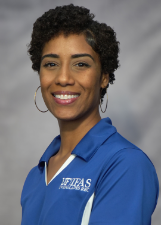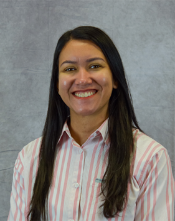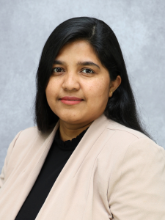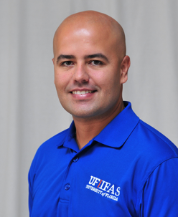
Dr. Pamela Aracena Santos
Soil, Water and Ecosystem Sciences
pamela.aracena@ufl.edu
Dr. Pamela Aracena Santos is a Postdoctoral Research Associate at the Everglades Research and Education Center, University of Florida. Originally from the Dominican Republic and raised in Miami, FL, she brings a diverse perspective to her research endeavors. Pamela earned her Ph.D. in Soil Science and Plant Nutrition from Selcuk University in Turkey, where she developed a strong foundation in agricultural research.
Her current research focuses on evaluating phosphorus (P) reduction in farm basins within the Everglades Agricultural Area (EAA). Specifically, she investigates differences in P reduction among farms implementing similar best management practices (BMPs), aiming to discern the impact of soil chemistry and historical land use on P concentration and loads. Pamela's work is integral to understanding and mitigating nutrient runoff in this critical ecosystem.
|

Dr. Larissa Ferreira Carvalho
Plant Pathology
larissacarvalhof@ufl.edu
Larissa is a postdoctoral research associate in the Plant Pathology Department. She received her PhD in Biological Sciences from Aberystwyth University, United Kingdom, and holds Bachelor's and Master's degrees in Agronomy/Plant Pathology from the University of Lavras, Brazil. Her research focuses on studying pathogen populations, crop protection methods, and plant-pathogen interactions, with an emphasis on genetic and phenotypic characterization of various pathosystems and the development of disease management strategies.
|

Dr. Tanjila Jesmin
Soil, Water and Ecosystem Sciences
tjesmin@ufl.edu
Dr. Tanjila Jesmin serves as a postdoctoral research associate at Everglades Research and Education Center within the Department of Soil, Water & Ecosystems. She earned her PhD in Natural Resources and Environmental Sciences from the University of Illinois at Urbana-Champaign. She obtained her Bachelor's and Master's degrees in Soil, Water, and Environment from the University of Dhaka, Bangladesh. Her expertise spans soil fertility, nutrient management, environmental biochemistry, and microbial ecology, with a primary focus on soil health. Her research is centered on exploring soil carbon and nutrient dynamics across various management systems.
With a passion for education, Dr. Jesmin has instructed undergraduate students in introductory soil science and provided guidance to graduate students seeking to deepen their understanding of regenerative farming practices. Committed to community outreach, she actively participates in extension activities to promote best management practices and educate local communities.
Beyond her professional endeavors, Dr. Jesmin enjoys traveling, nature photography, cooking, and cherishing moments with her family and friends.
|

Dr. Ricardo A. Lesmes
Agronomy
ricardolesmes@ufl.edu
Dr. Ricardo A. Lesmes-Vesga is a Postdoctoral Research Associate in the Sugarcane Agronomy Lab, led by Dr. Hardev Sandhu, at the Everglades Research and Education Center, University of Florida. Originally from Colombia, Ricardo completed a BSc in Agronomy from the National University of Colombia. He earned a MSc in Protected Crop Plant Production at the University of Almería in Spain; and received his PhD in Horticultural Sciences from the University of Florida.
His research focuses on integrated landscape management of energycane production systems as alternative crop and for marginal lands. His work involves the evaluation of feedstock production systems, in terms of biomass yield potential and suitable agronomic practices for plant nutrition, as well as the quantification of energycane ecosystem services.
|
-164x219.png)
Dr. Shabnam Sadeghibaniani
Agronomy
shabnam@ufl.edu
Shabnam is originally from Iran. She is a Post-Doctoral Research Associate in the Sugarcane Breeding Lab with Dr. Hardev Sandhu and Dr. Calvin Odero at the University of Florida, Everglades Research and Education Center (REC). She is involved with a multiple-year project. The project is about quantifying energy cane and sorghum (high fiber) biomass production to evaluate the suitability of energy crop production systems in the southern United States. In this project, she measures soil health parameters, environmental variables such as carbon sequestration, greenhouse gas emissions, soil and water quality, soil, and plant tissue sampling and nutrient analysis, and statistical data.
She received her Ph.D. at the University of Florida in the agronomy department between 2020-2023. Her focus was on soil fertility and crop nutrient management. The overall goal of her Ph.D. research project was to find the best Si extractant for rice and sugarcane production systems and to develop a soil-test Si calibration based on yield responses to calcium silicate on sandy and organic soils. The research focused on leaf and soil nutrient analysis, timing of fertilizer applications, and yields (sugarcane and rice) response to calcium silicate fertilizer. The new calibration assists growers by increasing crop yields and making cost-effective decisions regarding soil amendments and fertilizer applications.
|
Dr. Flavia C. Santos
Soil, Water and Ecosystem Sciences
flaviasantos@ufl.edu
Flávia Santos is a postdoctoral research associate at Everglades Research and Education Center (University of Florida) within the Department of Soil, Water & Ecosystems. She is agronomist and earned her PhD in Soils and Plant Nutrition from the University of Viçosa, Minas Gerais, Brazil. She is a researcher at Brazilian Agricultural Research Corporation (Embrapa) and her expertise spans soil fertility and plant nutrition with a primary focus on sustainable agricultural intensification in sandy soils and use of biological products. Her research is centered on to develop abiotic and biotic modes of improving nutrient use efficiency (NUE, primarily phosphorus) in agriculture and environmental systems. Also, she will be working on existing NSF and USDA funded projects on related topics. Research project(s) will include but not limited to testing biofertilizer products for NUE, and developing technologies that can capture and reuse phosphorus from point and non-point sources.
|





-164x219.png)